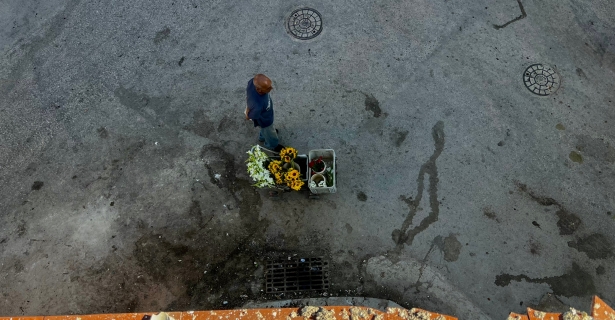I peered over the side of the balcony, and below me, on the corner, I see an elderly man with a cart of sunflowers and gladiolus. He’s not yelling out to let people know he’s selling flowers, just standing calmly.
I quickly descend the stairs to go speak to this man, but as I arrive, he’s no longer there. I almost head back up to the balcony of our Airbnb but decide to take a loop. Sure enough, there he is on the next corner.
“No hay alegria aca” (there’s no joy here), these words flow out of Juani’s lips, as he holds a cart filled with flowers.
Juani was born and raised on Campanario street. He’s an elderly Afro-Cuban man wearing a Yankees hat, a red and white striped shirt, and some light-wash jean shorts. His cart of flowers is looking sad this morning and he gifts me one of his white gladioli stems, two flowers blossoming off it. Short in stature and missing half of his teeth, Juani stood every morning on this corner from 9am to 1pm selling his sunflowers and gladiolus flowers, and the occasional rose. For a man who sells flowers, his vision of Cuba is dark. “No hay Esperanza, la única esperanza es el mar” (There’s no hope, the only hope is the ocean).
We both look out to the sea, where thousands of Cubans have risked their lives on rafts to get to the US.
“Cuba está vacío” (Cuba is empty).
To Juani, his community is breaking down. No longer are the bars filling up, the clubs have closed, the stores have emptied, and the lines just keep getting longer and longer. Down the street from us, a pharmacy sits on the street corner, and a poster of Che Guevara looms over empty shelves. The ration line for bread grows next to us. One piece of bread a day.
Juani is alone, but surrounded by community. Everyone seems to know him. As we converse on the side of the street corner, countless people, old and young come up to greet him or yell to him from across the street. An icon of the community it seems.
He has one brother, who pulls up to us on his motorcycle at one point during our conversation and says hello. His other brother left for New Mexico on a raft in 1994 but was murdered three years ago. A friend of this brother in the US sends him the occasional medicine. It is remittances and money from exile that keep so many Cubans surviving.
Cuba, to Juani, is home, but a home that is crumbling. “Las cosas estan malas, pero bien malas” (things are bad, really bad), Juani states as he shows me his ration card, recounts all the people who have left the neighborhood, and describes the hunger that persists. Juani tells me he used to go in stores for fun, to look at the products. Now, he dreams of the days he could find a medicine he’s prescribed anywhere on the island.
I ask Juani what it’s like to be the flower man, a symbol of so much hope and joy, and to feel so little of it. He laughs and his eyes melt a bit, looking at his cart. He does it to get money without the state involved. The regime has failed him time and again. Failed them all. Juani misses the days when the streets were filled with music and laughter, when you’d grab a bottle of rum for a good time, and when the malecón was bustling with people and rhythm. Instead, he sits out at night and watches the few people wander the streets.He stands on the corner, waiting for friends to come chat. Waiting.
But as an elderly man, he has few expectations of a different life to live. For the reality Juani faces, he emanates warmth. The first day he gave me a sip of his Cafecito out of a red plastic cup on his cart, the second day, we went to a window down the street, and he treated me to a coffee. We quickly sipped our slightly bitter cafecitos out of small glass cups and returned them to the woman to serve the next customer.
On each of my nine days in Cuba, I got to spend a short amount of time with Juani. He’d clue me into whether the people were able to get their bread ration for the day or if there was coffee or not. These daily interactions, filled with his honesty and tender compassion fill me with tremendous joy, heaviness, and hope for a world in which the flower man down the street can nourish himself and feel nourished by his country.

